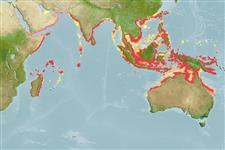Elasmobranchii (tubarões e raias) (sharks and rays) >
Carcharhiniformes (Ground sharks) >
Carcharhinidae (Requiem sharks)
Etymology: Carcharhinus: karcharos (Gr.), sharp or jagged; rhinus, an ancient name for sharks, from rhine (Gr.), rasp, both words alluding to a shark's jagged, rasp-like skin. (See ETYFish); amblyrhynchoides: -oides, Greek suffix meaning like, resembling, having the form of: similar to C. amblyrhynchos, to which it had previously been identified. (See ETYFish).
More on author: Whitley.
Environment: milieu / climate zone / depth range / distribution range
Ecologia
marinhas; intervalo de profundidade 0 - 75 m (Ref. 106604). Tropical; 26°N - 25°S, 43°E - 155°E
Indo-Pacific: Gulf of Aden and southwestern India east to Papua New Guinea, north to Taiwan and south to Australia.
Length at first maturity / Tamanho / Peso / Idade
Maturity: Lm 115.0 range ? - ? cm
Max length : 182 cm TL macho/indeterminado; (Ref. 106604); 167.0 cm TL (female)
Espinhos dorsais (total): 0; Raios dorsais moles (total): 0; Espinhos anais 0; Raios anais moles: 0. Grey or grey-brown on dorsal surface, white or cream below, with a conspicuous band of white on sides from pelvic fins to first dorsal fin; pectoral, dorsal and pelvic fins, and ventral lobe of caudal fin black or dusky-tipped, sometimes inconspicuously (Ref. 9997).
A little-known inshore, coastal pelagic species (Ref. 9997). Feeds mainly on fishes, also takes crustaceans and cephalopods (Ref. 6871). Viviparous (Ref. 50449). Probably taken in fisheries where it occurs (Ref. 9997). Utilized fresh and dried salted for human consumption; fins used in the oriental shark fin trade; liver oil processed for vitamins (Ref. 9997).
Viviparous, placental (Ref. 50449). 3 in a litter (Ref. 6871); 2-8 pups per litter (Ref.58048). Gestation period of 9-10 months (Ref. 6871). Size at birth 52 to 55 cm TL (Ref. 9997). Distinct pairing with embrace (Ref. 205).
Compagno, L.J.V., 1984. FAO Species Catalogue. Vol. 4. Sharks of the world. An annotated and illustrated catalogue of shark species known to date. Part 2 - Carcharhiniformes. FAO Fish. Synop. 125(4/2):251-655. Rome: FAO. (Ref. 244)
Categoria na Lista Vermelha da IUCN (Ref. 130435)
Ameaça para o homem
Traumatogenic (Ref. 4690)
Utilização humana
Pescarias: pouco comercial
Mais informação
ReferênciasAquaculturaPerfil para aquaculturaEstirpesGenéticaElectrophoresesHereditariedadeDoençasProcessamentoNutrientsMass conversion
ColaboradoresFotografiasStamps, Coins Misc.SonsCiguateraVelocidadeTipo de nataçãoÁrea branquialOutras referênciasCérebrosVisão
Ferramentas
Relatórios especiais
Descarregue XML
Fontes da internet
Estimates based on models
Preferred temperature (Ref.
123201): 24.9 - 29, mean 28 °C (based on 974 cells).
Phylogenetic diversity index (Ref.
82804): PD
50 = 0.5000 [Uniqueness, from 0.5 = low to 2.0 = high].
Bayesian length-weight: a=0.00479 (0.00221 - 0.01036), b=3.09 (2.92 - 3.26), in cm total length, based on LWR estimates for this Genus-body shape (Ref.
93245).
Nível Trófico (Ref.
69278): 4.2 ±0.6 se; based on diet studies.
Resiliência (Ref.
120179): Muito baixo, tempo mínimo de duplicação da população maior que 14 anos (Fec=3).
Fishing Vulnerability (Ref.
59153): Very high vulnerability (90 of 100).
Nutrients (Ref.
124155): Calcium = 24.2 [4.2, 126.5] mg/100g; Iron = 0.89 [0.23, 2.63] mg/100g; Protein = 21.6 [18.9, 24.0] %; Omega3 = 0.175 [0.070, 0.449] g/100g; Selenium = 33.3 [7.9, 100.4] μg/100g; VitaminA = 18 [6, 52] μg/100g; Zinc = 0.672 [0.310, 1.285] mg/100g (wet weight);
